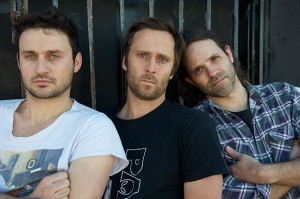Bondi Dreaming | Dreamhouse Artists and Tamarama Rock Surfers
- November 26th, 2011
- Posted in Uncategorized
- Write comment

It’s a race to the theatre the night I attend Bondi Dreaming. It’s raining. Rain brings with it, dull skies, slippery roads and a swell of drivers.
It’s OK I arrive at the theatre with 3 minutes to spare – the box office is backed up with punters. I still feel like I’m late – 3 years at least, not just the 8 minutes on the actual performance night.
First produced in 2008, at Newtown Theatre and then again as a part of Best of Independent Theatre in 2009 at Seymour Centre, THEN included in PlayWriting Ausralia’s National Play Festival and NOW at Bondi Pavillion and co-presented by the Tamarama Rock Surfers. It does seem to be a round about way for a show to return where it very much belongs. And according to writer/director Sam Atwell’s notes, the play has been developing and changing over the years – and now has a completely different context – with the Bali Nine whittled down, Schapelle Corby still in prison and a 14 year old boy in an Indonesian gaol -sadly the subject matter is still fresh.
The premise is fairly simple and familiar – three Bondi boys -Frankie (Christian Willis), Charlie (Greg Hatton) and Macca (Wayne Bradley) are in gaol for importing drugs. They keep themselves amused, alive and alert by imagining and enacting invented and real scenarios. The three actors are confined within a harsh concrete cell (set by Tom Bannerman, lighting by Nicholas Rayment). Like that of Genet’s “The Maids” or Satre’s “No Exit” there is a mixed of trapped desperation and theatre as survival technique.
However, I feel quite disconnected from the action. All three actors have a huge amount of conviction and passion for the story. But unfortunately it is the play which is still in need of development.
All three actors seem to have a huge amount of compassion and empathy for their character’s situation – but unfortunately I don’t. Though this is a portrait of a culture and a lifestyle within a specific suburb, it is not one I am sympathetic of or care for. All three fantasize about their lives in Australia – all three list the food they miss (Domino’s Hawaiian pizza) and their lifestyle (binge drinking and harassing women). They re-enact a Saturday night out. It is a culture of excess and misogyny, of beer drinking and violence. What is most interesting about this portrait is my reaction to these foolish, self-centred mysogenist men is that I am not surprised they are in this situation, and it is of their own doing and design. It does not stir any sympathy from me. Perhaps this is intended to be a nostalgic portrait of Australia? Perhaps. If that is so, I hope this portrait is such that it inspires the real life Frankie, Charlie and Macca’s to grow up and start contributing something useful and meaningful to society.
This mate-ship culture is fascinating to me. And I am interested in the secret world of men. But I don’t think the story provided me with any reason to wish any of them home.
Peppered with on projected footage of a variety of theatre and TV actors doing “to camera” interviews, the play itself lurches between each imagined vignette. It is confused and confusing why (if Macca was a part of the drug importing) that he arrives so late in the play, and there is no external pressure put on the inmates. The lighting is a little heavy handed I that it indicates mood, more than setting – disrupting the narrative with overly self-conscious choices.
It is explained that the creative team travelled to Bali to gain further insight into the prison.
Surprisingly not much of this was demonstated on stage. I had attended the show with a friend who had been in jail – and had experienced the horror and repulsion of sharing a room with his mate as he defecated in front of him. The Bondi Dreaming show, in comparison to his stories, seemed tame, sanitary. We don’t see the sexual tension – male-to-male intimacy is intimated – but nothing overt. If this show was to shock us into action, well it didn’t. If Bondi Dreaming was trying to show a softer, human, fragile side to these men – well, it tried – but the content of their imagination, the dreams and memories were not particularly profound, nor poetic, nor transformative.
Bondi Dreaming could serve as a cautionary tale. But I suspect that audience at this time, in this context perceive it as a celebration of Australian (Bondi) life – not as a warning that we need to clean ourselves up as a society or as a nation.
Despite my grave reservations about this particular play, in this context and it’s message – Sam Atwell, as a playwright shows some promise – though I would prefer to see what a director with a very sharp pencil would make of his work.